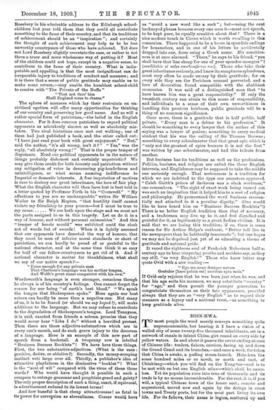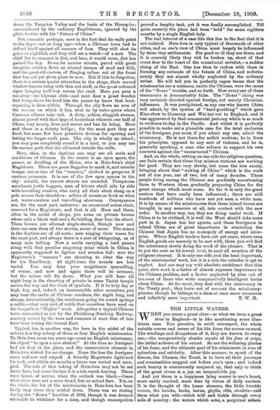ESIN-HW.A.
TO most people the word merely conveys something quite unpronounceable, but hearing it I have a vision of a walled city of some twenty-five thousand inhabitants, set in a network of canals in inland China, girt round on every side by yellow waters. In and about it passes the never-ending abeam of Chinese life : traders, fishers, carriers, faring up and down the Grand Canal and its branches,—and once a week, for token that China is awake, a puffing steam-launch. Hsin-hwa lies some hundred miles or so north, or north and east, of Chinkiang—which you will find on the Yang-tze—aud is to be met with on but one English atlas—which shall be name- less. Yet its population runs into tens of thousands, and its trade is by no means inconsiderable. For the rest, it is, if you will, a typical Chinese town of the lesser sort ; remote and sequestered, moved now and again by the doings in coast towns and Treaty ports, but for the most part living its own life, For its fellows, their name is legion, scattered up and
down the Yang-tze Valley and the basin of the bang-ho; unconsidered by the ordinary Englishman, ignored by the globe-trotter with his "Future of China."
Not romantic perhaps; save in the fact that its walls point to the days—not so long ago—when a Chinese town had to defend itself against all manner of foes. They still shut its gates at nightfall, and they still set a watch—of a sort. The chief foe to romance is dirt, and here, it would seem, dirt has gained the day. Down its narrow streets, paved with great irregular cobbles, flows an eternal stream of mud and filth, and the good old custom of flinging refuse out at the front door has not yet given place to new. But if this be forgotten, there is a certain quaint attraction in the shops, their carved window-frames hung with thin red stuff, or the great coloured signs hanging half-way across the road. Here you pass a tea-shop—the Chinese club—and next door a great wooden foot hung above his head lets the passer-by know that boot- repairing is done within. Through the city flows an arm of the stream on which it lies, shut in by water-gates where Customs officers take toll. A dirty, yellow, sluggish stream, almost paved with that type of houseboat whereon one half of China, very nearly, lives and moves and has its being. Here and there is a rickety bridge ; for the most part they are fixed, but some few have primitive devices for opening and letting the larger craft pass. The city is wholly an island ; you may pass completely round it in a boat, or you may use the narrow path that lies all round outside the walls.
Here, then, in the daytime one may see all sorts and conditions of Chinese. In the centre is an open space, the yamen, or dwelling of the Haien, who is Hsin-hwa's chief Magistrate. There are great flagpoles to mark it, and outside lounge one or two of the "runners," clothed in gorgeous if unclean garments. It is one of the few open spaces in the city : outside, the narrow streets are crowded. Prosperous merchants jostle beggars, men of leisure stroll side by side with travelling vendors, who carry all their stock slung on a pole across their shoulders : sellers of sweets or fruit or what not, water-carriers and travelling showmen. Conveyances are, for the most part, unknown : an occasional sedan-chair, reserved for a Magistrate, and that is all. Here and there, often in the midst of shops, you come on private houses where only a blank wall and a forbidding door face the street. These houses are oftenest single-storied, though now and then one sees them of two stories, never of more. The noises in the daytime are of all sorts: men singing their wares for the most part, and always there is a sort of whispering, as of many men talking. Now a coolie carrying a load passes along with that peculiar sing-song noise which in China is apparently supposed to lighten and sweeten toil: now the Magistrate's " runners " are shouting to clear the way for his Excellency. It night-time the sounds are less varied. You may hear your neighbours quarrelling, of course, and now and again there will be screams, but the noises will die down. What you will hear all night long is the chanting of priests in some Taoist temple across the way and the clash of cymbals. If it be holy day or high day, and, indeed, on innumerable other occasions, you may hear the rattle of Chinese crackers, the night long, and always, intermittently, the watchman going his round springs rattle,—that very sort of rattle that ourselves have used on the towpath in "Eights" week. Altogether a typical Chinese town, untouched as yet by the Chinkiang-Nanking Railway, scarcely moved by the wars and rumours of wars that of late have been vexing the eternal East.
Typical, too, in another way, for here in the midst of the natives is a tiny colony of three or four English missionaries. To Hsin-hwa some ten years ago came an English missionary, his object "to open a new station." At the time no foreigner had set foot in the place, and the conservative element in Hsin-hwa wished for no change. None the less the foreigner came and saw and stayed. A friendly Magistrate lightened his task, and within six months a house was rented and occu- pied. The tale of that taking of Hsin-bwa may not be set down here, but none the less it is a tale worth hearing. There were times, of course, when the outlook was black,—times when riots were not a mere dread, but an actual fact. Yet, on the whole, the lot of the missionaries in Hsin-hwa has been fairly easy since they settled down. There was no rioting during the " Boxer " troubles of 1900, though it was deemed advisable to withdraw for a time, and though reoccupation
proved a lengthy task, yet it was finally aecomplished. Till quite recently the place had been "held" for some eighteen months by a single English lady.
The real interest of a case like this lies in the fact that it is not isolated. Hsin-hwa is only typical of thousands of other cities, and so one's view of China must largely be influenced by these tiny settlements. For good or ill they are there, and it is scarcely likely they will be broken up, short of that event dear to the heart of the sensational novelist,—a sadden rising of the East. One has then to reckon with them in forming any estimate of the future of China, and unfortu- nately they are almost wholly neglected by the ordinary writer. He will tell you in perfectly vague terms that the missionaries are a nuisance, excite the Chinese, were the cause of the " Boxer " trouble, and so forth. Now every one of these statements is demonstrably false. The " Boxer " rising was very certainly directed against foreign, not merely Christian, influences. It was precipitated, as any one who knows China will admit, by the system of " land-grabbing " which gave Kiao-chow to Germany and Wei-hai-wei to England, and it was aggravated by that commercial jealousy which is so much in evidence to-day in the Pacific. And whilst it is perfectly possible to make out a plausible case for the total exclusion of the foreigner, you must, if you admit any one, admit the missionary. He is not there for selfish motives; he is, from his principles, opposed to any sort of violence, and he is, generally speaking, a man who refuses to support his own converts against the "unconverted" Chinese.
And, on the whole, setting on one aide the religious question, one feels certain that these tiny mission stations are working for good. They are very slowly, but none the less surely, bringing about that "waking of China" which is the work not of one year, nor of two, but of many decades. These people living among the Chinese are gradually accustoming them to Western ideas, gradually preparing China for the great change which must come. So far it is only the great centres that have really been influenced ; there are still hundreds of millions who have not yet seen a white men. It is by means of the missionaries that these inland towns are brought, in any measure at all, into contact with the new order. In another way, too, they are doing useful work. II China is to be civilised, it is well the West should take some part in it. Japan has her agents, and these foreigners in inland China are of great importance in reminding the Chinese that Japan has no monopoly of energy and enter- prise. Where English traders have not yet come, where even English goods are scarcely to be met with, there you will find the missionary slowly doing the work of the pioneer. That is to put the case on its lowest level, to omit all mention of the religions element. It is only one side, and the least important, of the missionaries' work, but it is a side the outsider is apt to neglect. And one may say with absolute confidence that this quiet, slow work is a factor of almost supreme importance in the Chinese problem, and a factor neglected by nine out of ten even of those who write comparatively intelligent books about China. At the most, they deal with the missionary in the Treaty port ; they leave out of account the missionary. pioneer, though he belongs to a class at once more numerous
and infinitely more important. T. W. H,



















































 Previous page
Previous page